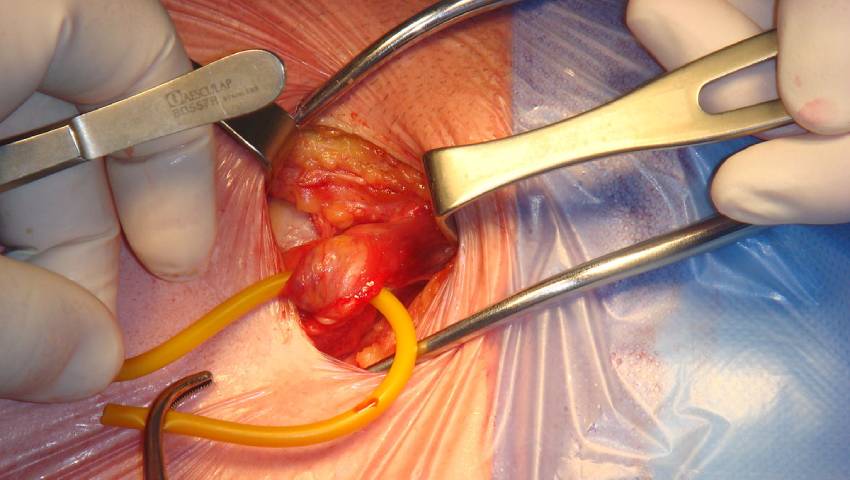
A hernia arises when abdominal contents bag through a gap in the abdominal wall, generally needing surgical treatment due to its painful nature. While surgery alleviates symptoms primarily, up to 30% of patients may face hernia recurrence, presenting patient challenges. In this blog, Dr. Arun S Nair hernia specialist in Thrissur delves into the factors contributing to hernia recurrence and provides practicable strategies to reduce its likelihood. Whether you have experienced hernia surgery or are considering it, understanding these factors empowers informed decision- making for effective health operations.
Understanding Hernia Recurrence:
Hernia surgery aims to repair weakened tissue and control the projection of organs. still, despite the best efforts of surgeons, hernias can occasionally reoccur. The reasons behind hernia recurrence are complex and frequently involve a combination of factors. Here’s a detailed look at the causes and preventative measures.
7 Common Causes of Hernia Recurrence:
- Incomplete Healing of Tissues: One of the main reasons for hernia recurrence is the deficient recovery of tissues after the original surgery. Dr. Arun Nair emphasizes the significance of proper postoperative care to ensure optimal recovery. Patients must follow all aftercare instructions to significantly reduce the threat of recurrence.
- Strain on the Surgical Site: Activities that place inordinate strain on the surgical point can increase the threat of recurrence. Cases should cleave to postoperative guidelines, which include restrictions on lifting heavy objects and engaging in emphatic conditioning. Following these guidelines helps tissues heal without unnecessary stress.
- Chronic Coughing or Sneezing: Chronic coughing or sneezing can contribute to hernia recurrence. Dr. Arun Nair suggests addressing underlying respiratory issues and seeking appropriate medical treatment to minimize these risks. Managing conditions like chronic bronchitis or allergies can protect the surgical site.
- Obesity: Being Fat or fat is a significant threat factor for hernia rush. redundant weight increases pressure on the abdominal wall, compromising the form. Weight management through a healthy diet and regular exercise is recommended as a preventative measure. Maintaining a healthy weight reduces strain on the repaired area.
- Smoking: Smoking can harm the recovery process and increase the liability of complications, including hernia recurrence. Dr. Arun Nair advises patients to quit smoking before and after hernia surgery to ameliorate overall outcomes. Quitting smoking enhances circulation and promotes better recovery.
- Poor Surgical Technique: The skill and experience of the surgeon are pivotal in preventing hernia recurrence. Poor surgical methods, inadequate closure of the defect, or failure to identify and address all weakened areas during surgery can lead to recurrence. Choosing an educated surgeon who specializes in hernia repair can make a significant difference.
- Infection and Complications: Infections following surgery can compromise the recovery process and weaken napkins, boosting the probability of a hernia recurrence. also, complications analogous to hematoma or seroma formation can affect surgical development. Proper surgical hygiene and postoperative care are essential to prevent infections and manage complications effectively.
9 Prevention Methods to avoid Hernia Recurrence:
- Adhering to Post-Operative Instructions: Following the surgeon’s postoperative guidelines is essential for proper reclamation. These instructions usually carry activity limitations, injury care, and follow-up appointments. Patients should avoid lifting heavy objects, emphatic activity, and any actions that could strain the surgical point until fully healed.
- Maintaining a Healthy Weight: Redundant weight places additional pressure on the abdominal wall, boosting the trouble of hernia recurrence. Achieving and maintaining a healthy weight through a right diet and regular exercise can significantly reduce this strain. Dr. Arun S Nair suggests considering consulting with a nutritionist or dietitian to develop a sustainable weight care plan.
- Managing Chronic Conditions: Habitual conditions similar to COPD, asthma, or allergies that beget the patient coughing or sneezing can strain the surgical repair. Proper management of these conditions is vital. This may involve medicinal, lifestyle changes, or other treatments to minimize coughing and sneezing.
- Quitting Smoking: Smoking impairs the recovery process and increases the liability for complications, including hernia recurrence. Quitting smoking before and after surgery improves blood circulation and promotes better recovery. Support programs, medicines, and counseling can help in smoking stop.
- Preventing Constipation: Straining during bowel movements due to constipation can put pressure on the abdominal wall. To avert constipation, incorporate high-fiber foods into your diet, stay doused, and exercise regularly. Over-the-counter coprolite softeners or fiber supplements may also be helpful if recommended by a healthcare provider.
- Strengthening Abdominal Muscles: Once cleared by your surgeon, engaging in gentle core- core-strengthening exercises can give more support to the abdominal wall. Strengthening the muscles around the surgical point can reduce the threat of recurrence. Always start with light exercises and gradually increase intensity under medical guidance.
- Regular Follow-Up Appointments: Attending all listed follow-up appointments allows your surgeon to monitor the recovery process and discover any implicit issues early. Regular check-ups are pivotal for achieving long-term success after hernia repair.
- Proper Nutrition: A balanced diet rich in vitamins and minerals supports the body’s recovery process. Focus on foods that promote tissue repair, similar to spare proteins, fruits, vegetables, and whole grains.
- Hydration: Staying well-doused helps maintain overall health and supports recovery. Acceptable fluid input is essential for precluding constipation and maintaining tissue elasticity.
While hernia recurrence poses a significant concern, Dr. Arun Nair specializes in understanding its causes and applying visionary measures to minimize pitfalls effectively. Consult with. Dr. Nair for individualized advice acclimatized to your requirements, assuring the best possible outcome. Book your appointment today to take visionary steps in managing your health and reducing the chances of hernia recurrence.
Recent News

How to Manage Fatty Liver?
14th April 2025
Is Your Constipation Constant? Here’s What
21st March 2025
When Should You Consider Surgery for
12th March 2025
What is Swallowing Disorder? How to
27th February 2025
Is Laser Surgery Good for Anal
3rd February 2025
5 Early Signs of Liver Damage
8th January 2025
The Differences Between Crohn’s and Ulcerative
21st December 2024
Diagnosed with IBD? Here’s What You
10th December 2024
Gallbladder Stone Treatment Pros and Cons
21st November 2024
7 Silent Signs You Have A
24th October 2024Contact info
1ST FLOOR ZABS FORT building, Civil Lane Road, Poothole P.O, Thrissur, Kerala 680004
Church Post Office Road near Parumala, Thiruvalla, Kerala 689626
+91-9539988886
drarungastrosurgeon@gmail.com
St. Gregorios Hospital, Thiruvalla
The Gastro Clinic(Elixir Clinic), Thrissur
© 2025 Dr Arun Gastro Surgeon All rights reserved



